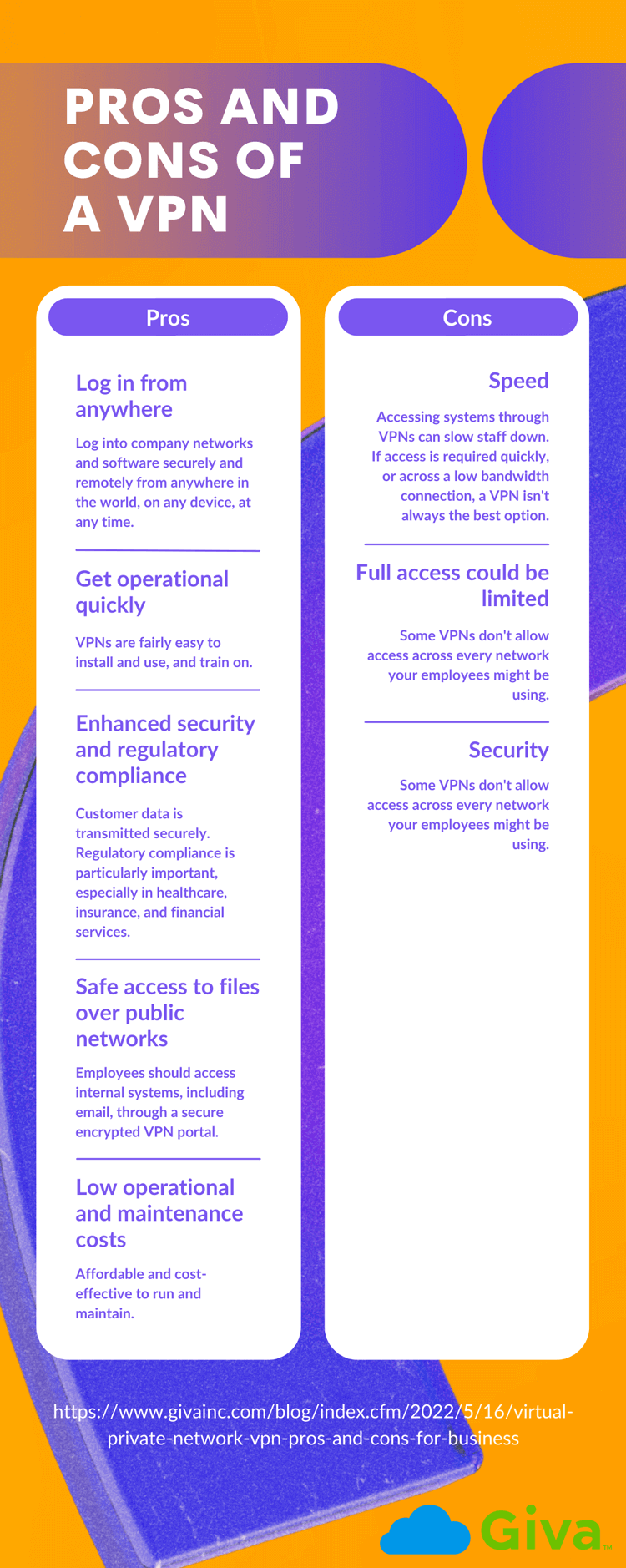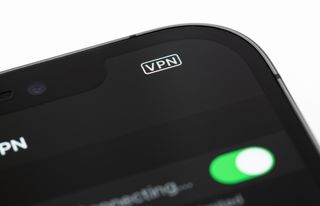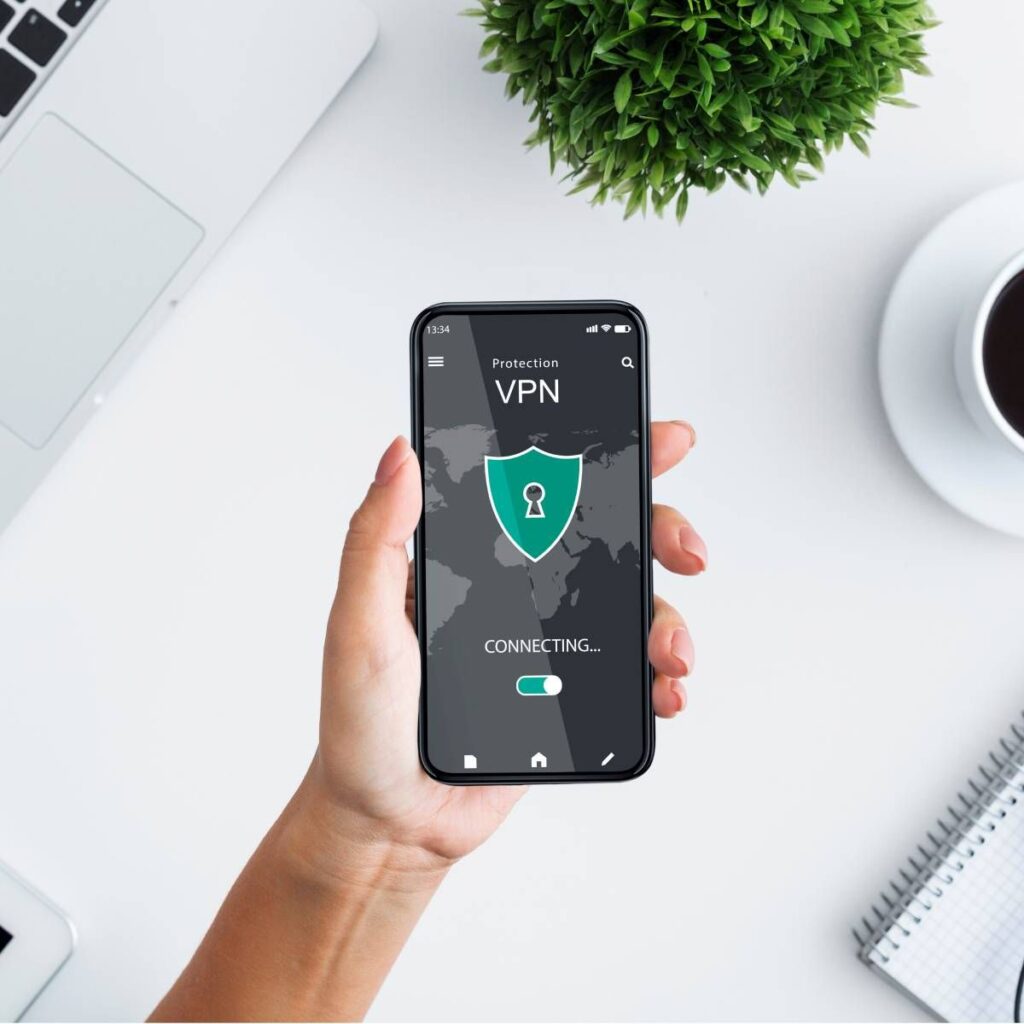What are the Advantages And Disadvantages of Using a VPN? The Advantages include enhanced online privacy and access to geo-restricted content. The disadvantages include potentially slower internet speeds and unreliable free VPN services.
A Virtual Private Network (VPN) offers a secure connection by encrypting your internet traffic. This boosts your privacy and helps you avoid censorship. VPNs can also bypass geo-restrictions, allowing access to content from different regions. However, using a VPN may slow your internet speed due to the encryption process.
Free VPN services can be unreliable and may have security risks. Choosing a reputable VPN provider is essential for balancing these pros and cons. You can enjoy a safer, more open internet experience with the right VPN.

Credit: www.givainc.com
Introduction To Vpns
A Virtual Private Network (VPN) helps you browse the internet safely. It hides your online activities from others. This means more privacy and security for you.
Many people use VPNs for different reasons. Let’s explore what VPNs are and their common uses.
What Is A Vpn?
A VPN stands for Virtual Private Network. It creates a secure connection over the Internet between your device and a VPN server.
The VPN server hides your real IP address. It makes your online actions private. Your data is also encrypted. This means no one can see what you are doing online.
Common Uses
People use VPNs for many reasons. Here are some common uses:
- Privacy: A VPN hides your online activities from hackers and spies.
- Access Blocked Sites: VPNs help you visit websites blocked in your country.
- Secure Public Wi-Fi: VPNs protect your data on public Wi-Fi networks.
- Streaming: Watch shows and movies that are not available in your region.
| Use | Benefit |
|---|---|
| Privacy | Hide online activities |
| Access Blocked Sites | Visit restricted websites |
| Secure Public Wi-Fi | Protect data from hackers |
| Streaming | Watch region-locked content |
Advantages Of Using A Vpn
Using a VPN provides multiple benefits for internet users. It enhances security, protects privacy, and allows access to restricted content. Here are the main advantages of using a VPN:
Enhanced Security
A VPN provides an extra layer of security for your data. It encrypts your internet connection, making it hard for hackers to access your information. This is especially important when using public Wi-Fi networks, which are often less secure and vulnerable to attacks. With a VPN, your data stays safe and secure.
Privacy Protection
One of the main benefits of a VPN is privacy protection. A VPN hides your IP address, making it difficult for websites to track your online activities. This means your browsing history and personal data remain private. VPNs also prevent ISPs from monitoring your internet usage, ensuring that your data is not sold to advertisers or other third parties.
Access To Restricted Content
VPNs allow you to access content that may be restricted in your region. This includes websites, streaming services, and other online platforms. Many platforms restrict content based on your location. A VPN can bypass these restrictions by masking your real location. This means you can enjoy a wider range of content worldwide.
- Stream movies and shows from different regions
- Access websites blocked in your country
- Play online games with servers in other regions
A VPN provides many advantages for users. It enhances security, protects privacy, and allows access to restricted content. VPN allows you to enjoy a safer and more open internet experience.
Disadvantages Of Using A Vpn
While VPNs offer many benefits, they also come with some drawbacks. Understanding these disadvantages helps you make an informed decision. This section outlines the key disadvantages of using a VPN.
Potential Speed Reduction
VPNs can slow your internet speed because your data travels through an additional server. Encrypting and decrypting data takes time, and high encryption levels can cause significant lag.
This can be frustrating if you need fast internet for gaming or streaming. Some VPNs offer high-speed servers, but they may cost more.
Compatibility Issues
Not all devices support VPN software, and older devices may not be compatible. Some smart TVs and gaming consoles lack VPN support.
You might need extra hardware or software to use a VPN on these devices, which adds to the complexity and cost. Also, some websites block access from known VPN servers.
Cost Considerations
While free VPNs exist, they often have limitations. Paid VPNs offer better security and speed, but they can be expensive.
Many VPN services charge monthly or annual fees. Consider this cost in your budget. Free VPNs may also sell your data to third parties. This can compromise your privacy.
Below is a comparison table of free vs. paid VPNs.
| Feature | Free VPN | Paid VPN |
|---|---|---|
| Speed | Slower | Faster |
| Security | Basic | Advanced |
| Data Limit | Limited | Unlimited |
| Support | Limited | 24/7 Support |
Credit: www.quora.com
Choosing The Right Vpn
Choosing the right VPN can significantly improve your online experience. With numerous options available, it’s essential to understand the key features and reputable providers.
Key Features To Look For
When selecting a VPN, consider the following key features:
- Encryption: A strong encryption protocol ensures your data remains private and secure.
- Speed: The VPN should offer high-speed connections without lag.
- Server Locations: More server locations provide better access to global content.
- No-Log Policy: A strict no-log policy means the VPN does not track your online activities.
- Compatibility: Ensure the VPN is compatible with your devices and operating systems.
- Customer Support: Reliable customer support is crucial for resolving issues quickly.
These features ensure a secure, fast, and versatile VPN experience.
Reputable Providers
Choosing a reputable provider is crucial for a reliable VPN service. Here are some well-known providers:
| Provider | Key Features |
|---|---|
| ExpressVPN |
|
| NordVPN |
|
| CyberGhost |
|
These providers offer robust features and strong reputations, ensuring a reliable VPN experience.

Credit: www.fortinet.com
Frequently Asked Questions
What Is The Downside Of Using Vpn?
When Should You Not Use A Vpn?
Is Vpn A Good Thing Or A Bad Thing?
Does A Vpn Slow Down Your Internet?
Conclusion
Using a VPN offers significant benefits like enhanced security and privacy. Yet, it has downsides, such as slower speeds and potential costs. Weighing these advantages and disadvantages helps you make an informed decision. Choose wisely to best meet your needs for online security and privacy.


